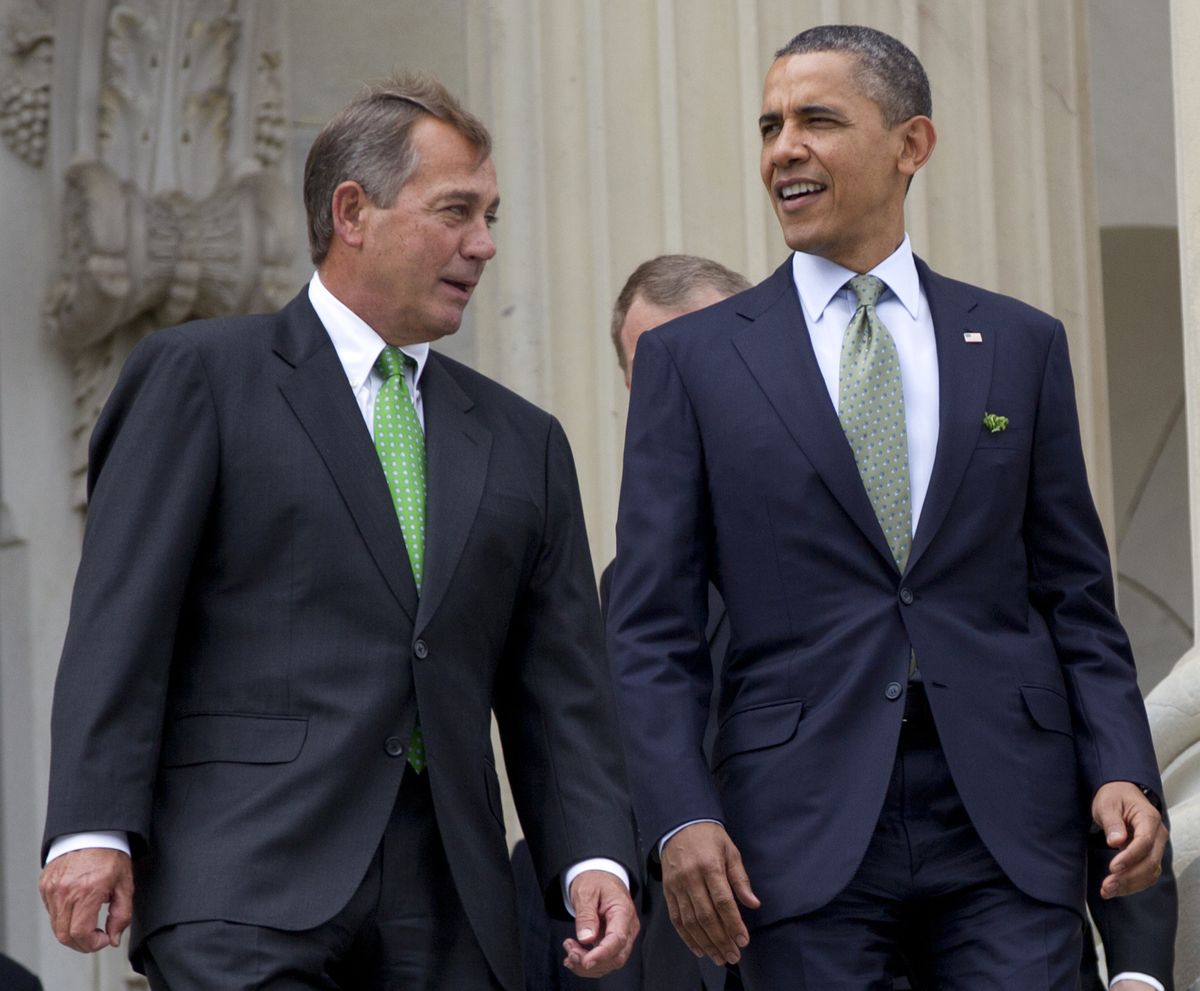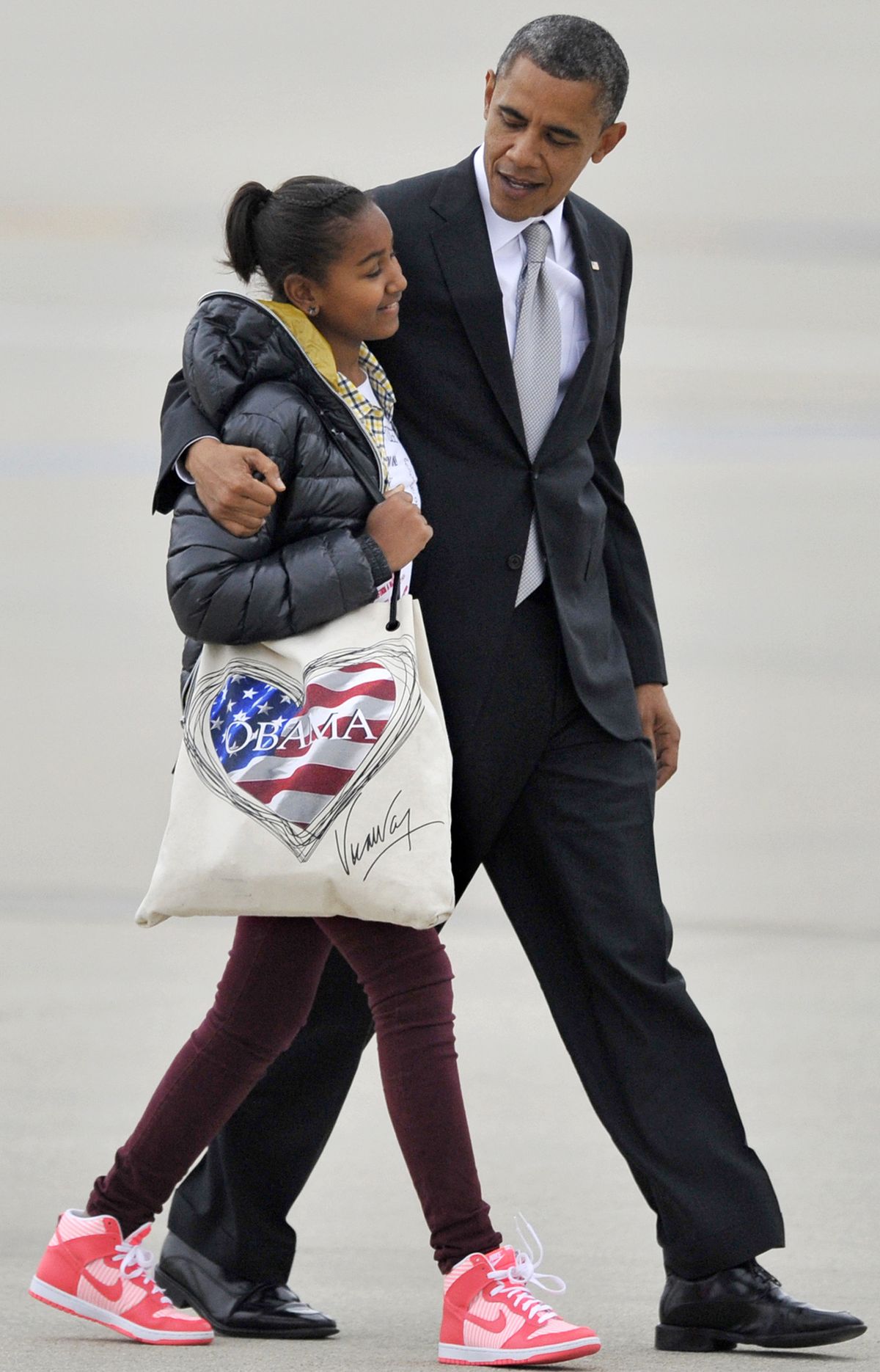Obama, Boehner look to compromise
Leaders seek to avoid ‘fiscal cliff’
House Speaker John Boehner of Ohio and President Barack Obama walk down the steps of the Capitol in Washington in March. (Associated Press)
WASHINGTON – One day after a bruising, mixed-verdict election, President Barack Obama and Republican House Speaker John Boehner both pledged Wednesday to seek a compromise to avert looming spending cuts and tax increases that threaten to plunge the economy back into recession.
Added Senate Majority Leader Harry Reid, D-Nev.: “Of course” an agreement is possible.
While all three men spoke in general terms, Boehner stressed that Republicans would be willing to accept higher tax revenue under the right conditions as part of a more sweeping attempt to reduce deficits and restore the economy to full health.
He suggested a stopgap measure that would buy time for negotiations to continue in 2013 on a broader deal to reform the tax code and entitlement spending – the so-called grand bargain that has eluded leaders.
But while Boehner softened his party’s confrontational tone one day after its electoral losses, he stood by the GOP’s core no-new-taxes pledge that has prevented a deal with the White House. The substance of Boehner’s proposed tax overhaul relies on economic growth to produce revenue.
“There is no mandate for raising tax rates on the American people,” said Rep. Eric Cantor, R-Va., the House majority leader. “There is a mandate for avoiding the fiscal cliff.”
At least one Republican, outgoing Sen. Olympia Snowe of Maine, urged her party to the negotiating table.
“I also implore my fellow Republicans to take the lead in setting the tone for a results-oriented lame-duck session, by reaching across the political aisle,” she said.
Democrats welcomed the conciliatory overture but panned its substance, particularly the tax-cut proposals echoing those Mitt Romney advocated in his failed presidential bid. Nonpartisan experts have said the proposals do not add up.
“The election’s over,” and Americans are tired of gridlock, Senate Majority Leader Harry Reid of Nevada said. “They want a balanced approach to everything, but especially the situation we have dealing with this huge deficit and taxes.”
While the impending “fiscal cliff” dominates the postelection agenda, the president and Republicans have other concerns, too.
Obama is looking ahead to top-level personnel changes in a second term, involving three powerful Cabinet portfolios at a minimum.
And Republicans are heading into a season of potentially painful reflection after losing the presidency in an economy that might have proved Obama’s political undoing. They also have fallen deeper into the Senate minority after the second election in a row in which they lost potentially winnable races by fielding candidates with views that voters evidently judged too extreme.
The maneuvering on the economy – the dominant issue by far in the campaign – began even before Obama returned to the White House from his hometown of Chicago.
After securing a second term, the president is committed to bipartisan solutions “to reduce our deficit in a balanced way, cut taxes for middle class families and small businesses and create jobs,” and he told congressional leaders as much in phone calls, the White House said.
Boehner, whose anti-tax Republicans renewed their House majority on Tuesday, said GOP legislators were “willing to accept new revenue under the right conditions.” That means tax reform and economic growth rather than raising rates, he emphasized, and accompanying steps to rein in the government’s big benefit programs.
“The question we should be asking is not ‘which taxes should I raise to get more revenue,’ but rather, ‘which reforms can we agree on that will get our economy moving again?’ ” the Ohio Republican said at the Capitol.
Boehner’s stopgap proposal would extend current tax rates for another year for all Americans, including the well-to-do. The rates established during the George W. Bush administration are set to expire Dec. 31.
While both the president and Boehner sent signals of bipartisanship, there remain wide differences between the two on specifics. At the same time, each man has something of a postelection mandate, given Obama’s re-election and the Republicans’ successful defense of their House majority.
The reference to a balanced approach to deficit reduction reflected Obama’s campaign-long call for higher taxes on incomes above $200,000 for individuals and $250,000 for couples.
That was something Boehner made plain he opposes.
Reid told reporters that any solution should include higher taxes on “the richest of the rich.” That was in keeping with Obama’s election platform, which calls for the expiration of tax cuts on higher-income earners.
Barring legislation to avoid the “fiscal cliff” by year’s end, taxes are on course to rise by more than $500 billion in 2013, and spending is to be cut by an additional $130 billion or so, totals that would increase over a decade. The blend is designed to rein in the federal debt, but officials in both parties warn it poses a grave threat to an economic recovery that has been halting at best.
Obama and congressional leaders in both parties say they want an alternative, but serious compromise talks were nonexistent during the fierce campaign season.
That ended Tuesday in an election in which more than 119 million votes were cast, mostly without controversy despite dire predictions of politically charged recounts and lawsuits while the presidency hung in the balance.
Obama won the popular vote narrowly, the electoral vote comfortably, and the battleground states where the campaign was principally waged in a landslide. With 99 percent on the precincts counted, Obama had 60,653,724 votes, or 50 percent, to Romney’s 57,813,403 votes, or 48 percent.

